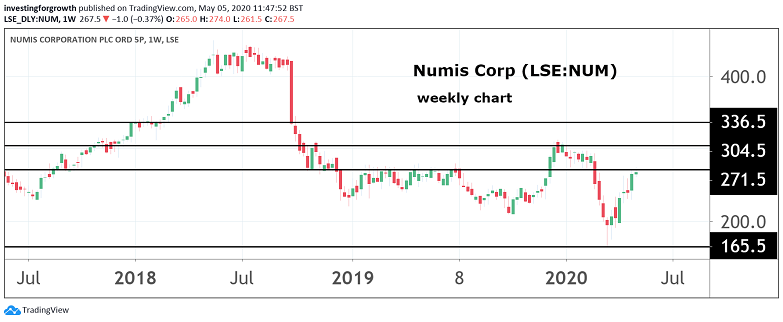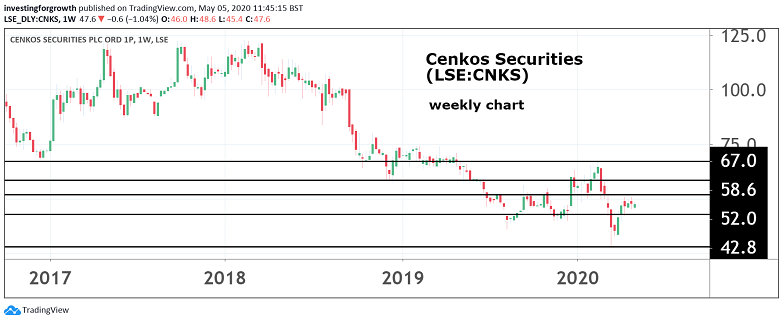Stockwatch: these two AIM stocks are a geared play on market trends
Both small-caps were successful tips for our companies analyst, and could be winners again.
5th May 2020 11:50
by Edmond Jackson from interactive investor
Both small-caps were successful tips for our companies analyst, and could be winners again.

A scenario exists where stocks remain generally at a premium to intrinsic values, given investors now fear inflation and any yield at all may be better than what you might get from bonds or troubled property tenants.
Yet business margins will be compromised by social distancing as attempts to ease lockdown are made. These two trends imply firms will resort to equity, rather than riskier and costlier debt, to bolster their balance sheets. So, even if flotations are lacklustre, we can expect more placements in due course.
It might not be a fundraising bonanza, yet the context for corporate stockbrokers has been a difficult two years, where the Brexit impasse then General Election damaged revenue, and their operational gearing hit profits even more. So, it is possible that a medium-term turning point already exists.
A tale of two rather contrasting brokers
The two chief means to play this theme – both AIM-listed – are poster boy Numis Corporation (LSE:NUM), capitalised at around £280 million with its price at 269p, and relative ugly duckling Cenkos Securities (LSE:CNKS), valued at around £27 million with its price at 47.5p.
Both stocks have rebounded from March lows, although the stand-out valuation is Numis on a remarkable 33x prospective earnings, already expected to soar over 70% in its year to end-September.
Its very strong cash flow profile (in good years) and distributable cash reserve, probably mean the £12.7 million cost of a 12p total dividend is sustainable.
Equity bears may say that Numis’s rebound from a 167p March low discounts all this, and more, it being a prime example of how the market is ignoring a highly uncertain environment.
Indeed, the broker has looked somewhat tottering - while top of the City league with 221 corporate clients, it lost six net in the first quarter of this year.
I drew attention as a 'buy' at 195p in June 2016, and the stock more than doubled in the following two years to over 430p. It then began a volatile downtrend.
A more positive - even objective - view is to see this as Brexit uncertainties then Covid-19 shock, which does indeed establish a low.

Source: TradingView. Past performance is not a guide to future performance
An update for Numis’s six months to end-March cited like-for-like revenue 10% higher, albeit with “subdued” deal volume partially offset by a rise in average fee.
The boost came not from corporate broking, but equities trading, and the like-for-like cash position has risen.
“Whilst it is too early to predict the timing of a recovery in our investment banking pipeline, we are committed to supporting our corporate clients as they consider any actions they may implement to insulate and protect their businesses amid such uncertainty.”
To me, that adds up to a Hold rating given they clearly identify the opportunity while remaining prudently cautious.
A weaker scenario would be that hopes are unfulfilled and that markets turn down in due course, making for more difficult trading.
| Numis Corporation - financial summary | ||||||
|---|---|---|---|---|---|---|
| year end 30 Sep | 2014 | 2015 | 2016 | 2017 | 2018 | 2019 |
| Turnover (£ million) | 92.9 | 96.0 | 116 | 134 | 138 | 109 |
| Operating margin (%) | 25.7 | 27.0 | 28.0 | 28.6 | 22.8 | 10.9 |
| Operating profit (£m) | 23.9 | 25.9 | 32.5 | 38.1 | 31.4 | 11.9 |
| Net profit (£m) | 20.1 | 21.5 | 26.4 | 30.4 | 26.7 | 9.3 |
| IFRS3 earnings/share (p) | 17.1 | 18.3 | 22.4 | 25.9 | 23.0 | 8.1 |
| Normalised earnings/share (p) | 17.1 | 18.3 | 22.4 | 25.9 | 23.0 | 8.1 |
| Price/earnings multiple (x) | 32.6 | |||||
| Operating cashflow/share (p) | 18.1 | 5.5 | 41.3 | 37.0 | 39.6 | -2.4 |
| Capital expenditure/share (p) | 0.2 | 3.5 | 0.3 | 0.4 | 1.2 | 0.7 |
| Free cashflow/share (p) | 17.8 | 2.0 | 41.0 | 36.6 | 38.4 | -3.1 |
| Dividend/share (p) | 10.5 | 11.5 | 12.0 | 12.0 | 12.0 | 12.0 |
| Yield (%) | 4.5 | |||||
| Covered by earnings (x) | 1.6 | 1.6 | 1.9 | 2.2 | 1.9 | 0.7 |
| Cash (£m) | 122 | 117 | 138 | 143 | 156 | 123 |
| Net assets per share (p) | 97.7 | 102 | 114 | 126 | 135 | 132 |
| Source: historic Company REFS and company accounts |
Although a principally market-making operation should benefit from higher activity, the prospect to fear would be a depression-type slowdown, but that seems offset by the sheer extent of liquidity boost to the financial system.
Cenkos is the leading AIM broker
The chief risk I perceive with Cenkos is whether a much weaker business environment – curbed by social distancing – fundamentally shifts investor risk preference away from AIM-listed situations.
More positively, economic restructuring could underwrite a new bull market as the next generation of businesses get support from investors desperate for any kind of financial return.
It is possible that mid to big cap stocks consolidate on premium values that look to offer nothing exciting by way of risk/reward or fresh story.
- Should you really sell your shares in May this year?
- Stockwatch: A near double-digit yield that might just hold
- James Mee interview: dividend strategy and favourite stocks
Meanwhile, latest 2019 prelims from Cenkos Securities were pretty dire, reflecting political uncertainties that meant a 30% reduction in overall funds raised by AIM companies last year. A net break-even caused revenue to fall 42% to £25.9 million, versus £2.4 million net profit in 2018.
Yet, despite earnings per share slashed from 4.4p a share to minus 0.2p, the total dividend has only been trimmed to 3p from 4.5p in 2018. The 2019 interim payout was 2p a share, hence the final 1p payout marks a cut of one-third in the total dividend from a nominal 4.5p in 2018.
(Mind that data in tables, e.g. showing 6.5p in respect of 2018, refer to actual payments made during a calendar period.)
It is still well below historic payouts like the 17p in 2014, benefiting from the £1.4 billion flotation of the AA (AA.), if reflecting the feast-and-famine nature of flotations linked to stock market trends. As a smaller operation, it is a bit frustrating that Cenkos does not break down its figures to show the results from market-making (given Numis has demonstrated a disparity).
A 6.4% yield is well-supported by distributable cash
Despite last year's slump in cash flow (due to a £17.9 million decrease in trade payables) the required £1.7 million payout for a 3p dividend is amply covered by £13.5 million end-2019 capital resources - in excess of regulatory capital requirements, that’s clarified in the “going concern” section of notes to the 2019 accounts.
Cenkos likes to remind investors that, since floating on AIM in 2006, it has returned £114.1 million cash to shareholders, equivalent to 176.3p a share. However, this does significantly relate to a business that highly-geared operationally, through a period many would say benefited from Neil Woodford’s boom years – this fund manager taking stock from many Cenkos flotations and others jumped aboard. Such a mini bubble has since burst.
The final dividend decision would also reflect a “pleasing” commercial situation – of £80 million raised in the flotation of corporate finance advisory group FRP (FRP), the largest on AIM this year, plus a number of secondary fundraisings.
The CEO says:
“We are continuing to work closely with our corporate clients to assess the impact of Covid-19 and the disruption many of them are experiencing. We have a good pipeline, a cost base that is significantly below the 2019 level and a strong balance sheet, so I look forward to 2020 with tempered optimism.”
This new CEO from last August set about a £3 million reduction in the annual cost base; interim staff costs were cited cut by 59% to £6.5 million, such that total annual administrative costs have been slashed from £41.8 million to £25.8 million. While their percentage of revenue has deteriorated from 93% very close to 100%, cuts are likely to lag falling revenue and should now be helping net profit.
The client base remains 'solid' at 100 companies and investment trusts of which 45% have been with Cenkos over five years, although the financial statements do not quantify any recurring income this might constitute. It is also down on a range of 111 in 2011 to 130 in 2014, then a reducing trend to the lowest in about a decade.
| Cenkos Securities - financial summary | ||||||
|---|---|---|---|---|---|---|
| year end 31 Dec | 2014 | 2015 | 2016 | 2017 | 2018 | 2019 |
| Turnover (£ million) | 88.5 | 76.5 | 43.7 | 59.5 | 45.0 | 25.9 |
| Operating margin (%) | 30.3 | 25.8 | 11.4 | 16.8 | 6.8 | 0.0 |
| Operating profit (£m) | 26.8 | 19.8 | 5.0 | 10.0 | 3.1 | 0.1 |
| Net profit (£m) | 21.3 | 15.4 | 2.5 | 7.2 | 2.4 | 0.0 |
| IFRS3 earnings/share (p) | 32.0 | 25.9 | 5.8 | 15.0 | 4.4 | -0.2 |
| Normalised earnings/share (p) | 32.0 | 25.9 | 5.8 | 16.0 | 6.4 | |
| Operating cashflow/share (p) | 18.0 | 45.0 | -8.0 | 34.9 | 5.4 | -19.7 |
| Capital expenditure/share (p) | 0.6 | 0.3 | 0.5 | 0.7 | 0.5 | 0.6 |
| Free cashflow/share (p) | 17.4 | 44.7 | -8.5 | 34.2 | 4.9 | -19.1 |
| Dividend/share (p) | 17.0 | 13.0 | 2.0 | 9.5 | 6.5 | 3.0 |
| Yield (%) | 6.3 | |||||
| Covered by earnings (x) | 1.9 | 2.0 | 2.9 | 1.6 | 0.7 | |
| Cash (£m) | 42.8 | 46.3 | 38.1 | 47.4 | 45.5 | 18.3 |
| Net assets per share (p) | 62.1 | 50.4 | 47.9 | 52.5 | 48.7 | 43.5 |
| Source: historic Company REFS and company accounts |
So Cenkos rates a Hold. It is premature to call an uptrend but appropriate to point out that the situation could now be bottoming out, assuming that we do not see fewer flotations outweigh any improvement from placements.
I drew attention to Cenkos shares at 47.5p last October, with the rationale that its stock was on about 8x 2018 normalised earnings and, although 2019 revenue had been guided lower, the second half-year had started well. The stock rose progressively to 65p by mid-February then slumped to 31.5p during the Covid-19 sell-off.

Source: TradingView Past performance is not a guide to future performance
Watch the trend in flotations and placements
Both stocks appear fairly priced for now, also considering this type of financial stock can be quite a geared play on market trends. If a traditional sense of 'Sell in May' conflates with dire news generally, to send markets lower, these two will dip again.
Yet their cash generation/reserves support meaningful dividends, during which time they are also nowadays slimmed down so that any improvement in revenue should quickly benefit profit. The crux to watch from company news generally is how much capital-raising actually evolves.
Edmond Jackson is a freelance contributor and not a direct employee of interactive investor.
These articles are provided for information purposes only. Occasionally, an opinion about whether to buy or sell a specific investment may be provided by third parties. The content is not intended to be a personal recommendation to buy or sell any financial instrument or product, or to adopt any investment strategy as it is not provided based on an assessment of your investing knowledge and experience, your financial situation or your investment objectives. The value of your investments, and the income derived from them, may go down as well as up. You may not get back all the money that you invest. The investments referred to in this article may not be suitable for all investors, and if in doubt, an investor should seek advice from a qualified investment adviser.
Full performance can be found on the company or index summary page on the interactive investor website. Simply click on the company's or index name highlighted in the article.
Disclosure
We use a combination of fundamental and technical analysis in forming our view as to the valuation and prospects of an investment. Where relevant we have set out those particular matters we think are important in the above article, but further detail can be found here.
Please note that our article on this investment should not be considered to be a regular publication.
Details of all recommendations issued by ii during the previous 12-month period can be found here.
ii adheres to a strict code of conduct. Contributors may hold shares or have other interests in companies included in these portfolios, which could create a conflict of interests. Contributors intending to write about any financial instruments in which they have an interest are required to disclose such interest to ii and in the article itself. ii will at all times consider whether such interest impairs the objectivity of the recommendation.
In addition, individuals involved in the production of investment articles are subject to a personal account dealing restriction, which prevents them from placing a transaction in the specified instrument(s) for a period before and for five working days after such publication. This is to avoid personal interests conflicting with the interests of the recipients of those investment articles.